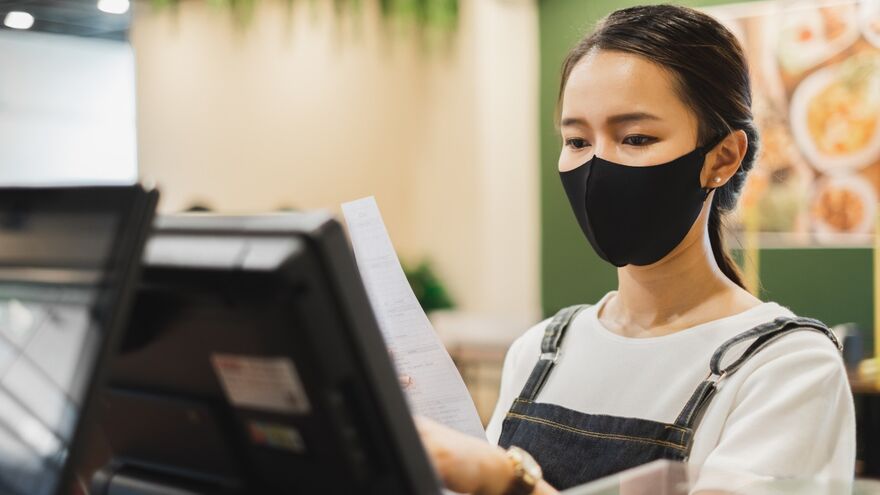Get in touch
To contact us, please fill out this form and we will get back in touch as soon as possible. Your personal data will be processed in accordance with our privacy policy which can be found here.

With a variety of organisations (including Waterstones, Tesco, Sainsbury’s and TFL) now requiring face coverings post ‘Freedom day’, employers in the leisure and tourism sector should review their internal policies and consider whether they will require employees and visitors to wear face coverings.
The introduction of the Health Protection (Coronavirus, Wearing of Face Coverings in a Relevant Place) (England) Regulations 2020 created a legal requirement from 24 July 2020 (and subject to exemptions) to wear a face covering in certain places, including (but not limited to):
On 24 September 2020 the obligation extended to staff employed in the retail, leisure and hospitality sectors.
Legal restrictions did not extend to offices. Instead, guidance from the Department for Business, Energy and Industrial Strategy required businesses to complete a risk assessment and to consider what if any reasonable adjustments were needed for staff and customers with disabilities, whilst also arranging work spaces to keep staff apart.
Northern Ireland, Scotland and Wales each have a devolved system with varying rules.
The legal requirement to wear a face covering in England as set out above ceased on 19 July 2021. Scotland and Wales appear to be developing once more a separate regime.
If you, as an employer, wish for employees and customers or visitors to wear a face covering it is important that you communicate that policy to everyone as soon as possible and consider how you are going to police or enforce the policy should it not be adhered to.
As a result of the working from home guidance and the furlough scheme, many workplaces will have had reduced staffing levels at their premises. As workers return to workplaces, businesses will now need to consider whether additional steps will be necessary (or if current risk assessments need review).
Current guidance on face coverings provides “You should also wear a face covering in indoor places not listed here where social distancing may be difficult and where you will come into contact with people you do not normally meet.” Although the legal restrictions are due to end, the risk remains that staff or customers could still become infected with the virus especially as we currently are seeing a dramatic surge in the current rates of infection.
Consider if any staff are unable to wear a facemask, due to an underlying health condition. Organisations should remain aware of potential claims for disability discrimination, and ensure that sufficient processes are in place.
Remain aware of potential claims of harassment or victimisation in circumstances where some employees with a protected characteristic are unable to wear face coverings.
Should the decision be made to require face masks, organisations should ensure sufficient procedures are in place to afford employees with disabilities reasonable adjustments to protect against potential claims for disability discrimination. Employers should engage with staff to explain the rules.
Although the health and safety of staff and clients will be a priority, businesses will need to factor in the economic impact of continuing restrictions. Would requiring masks encourage or discourage potential shoppers or visitors? Will those tired of masks favour premises where one is not required. At the other end of the spectrum will safety conscious customers or shoppers choose to avoid businesses that are not requiring face coverings?
Equally, businesses must be aware of the risks that are posed in the event of an outbreak of the virus at the place of work. It has been known for businesses to close due to the workforce being required to self isolate. Business should ensure that the measures in place remain effective in protecting staff and customers in respect of the virus.
On 12 July 2021 the Prime Minister’s office stated “the government expects and recommends that face coverings are worn in crowded and enclosed spaces, such as public transport, when mixing with people you don’t normally meet.”
Tesco and many of the key food retailers have announced that they will continue to require shoppers to wear face masks to “be on the safe side”.
Consider your work place. Review your risk assessment. Engage with staff. There will not be a one-size fits all approach, and consideration will be needed for facts on the ground.
If you require any further assistance or wish to discuss the issue further then please contact a member of the Leisure and Tourism Team.
The information on this site about legal matters is provided as a general guide only. Although we try to ensure that all of the information on this site is accurate and up to date, this cannot be guaranteed. The information on this site should not be relied upon or construed as constituting legal advice and Howes Percival LLP disclaims liability in relation to its use. You should seek appropriate legal advice before taking or refraining from taking any action.
To contact us, please fill out this form and we will get back in touch as soon as possible. Your personal data will be processed in accordance with our privacy policy which can be found here.